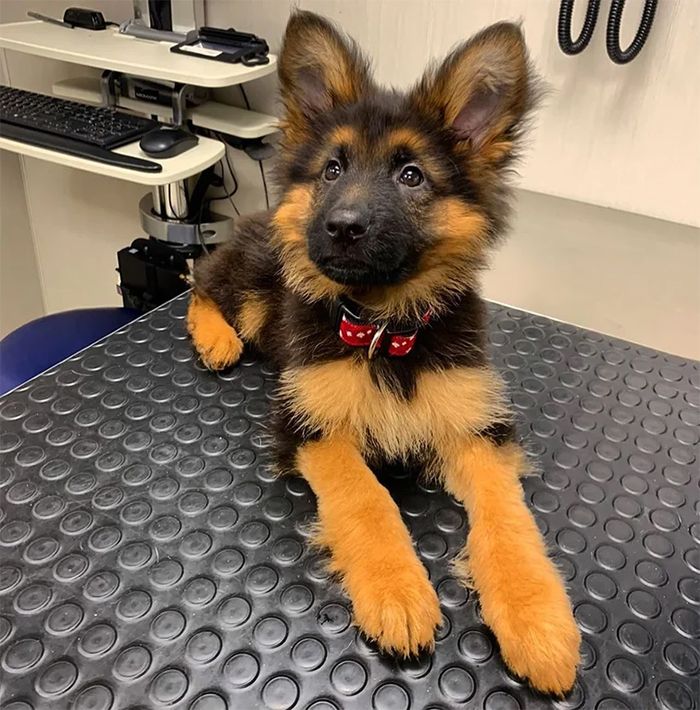German Shepherd puppies are among the most popular breeds of dogs in the U.S. Known for their physical and mental stamina, these adorable animals are celebrated for their guard dog instincts. These pups love to play all day, every day, showing endless affection and bonding with humans.
The German Shepherd made its mark as a new breed on the scene in the late 1800s in Germany. Developed by a German cavalry officer, Captain Max von Stephanitz, who dedicated his life to promoting the breed as versatile and intelligent. Their popularity has soared over decades, making them famous through figures like Rin Tin Tin in the 1920s pop-culture history.
German Shepherds stepped into the limelight as seeing-eye dogs, thanks to their patient and determined nature. Buddy, a female German Shepherd, became the first seeing-eye dog in 1928, sparking a worldwide movement.
A Brief Background on German Shepherd Dogs!

German Shepherd Dogs were first bred in Germany in 1899 by Captain Max Von Stephanitz. He wanted an unmatched herding dog that could adapt as society industrialized. As a younger breed, they soon showed their skills not just in herding but also in police and military training.
During World War 1, they served as supply carriers, guards, messengers, Red Cross dogs, and sentries. Their bravery was not just shown on the fields of France; after WWI, they also became heroes in the United States. One famous dog, Rin Tin Tin, who was rescued as a small five-day-old puppy from a destroyed kennel in France, went on to star in 26 movies in Los Angeles and became a popular choice among dog lovers.
German shepherd puppy facts

German Shepherd puppies are known for their curious nature. They are a highly intelligent breed, which makes them easy to be trained for various tasks and tricks. They love to show off their skills, making them perfect for learning new things. If you’re thinking about a new puppy, these interesting facts about German Shepherds are sure to excite you!
Size
When they are fully grown, male German Shepherds usually weigh about 75 pounds. Females are a bit smaller and might weigh around 60 pounds. From the ground to the shoulder, males typically measure 26 inches tall, while females reach about 24 inches.
Breed Characteristic
The German Shepherd is an iconic breed known for its muscular stature. They have thick, double-coated fur of medium length that is a mixture of light and dark browns. This makes them very strong and beautiful.
Temperament
German shepherd puppies are very playful and loyal friends. They love spending time with humans and are great protectors of their homes. These puppies are also quick learners with amazing abilities, making them good at any job they are trained to do. Remember, they enjoy chewing on a delicious bone to stay happy!
Grooming and Health Needs
German shepherd puppies are very eager to please and learn quickly. With positive, reward-based training, they can master impressive tricks. Start them young in puppy training classes where they get socialized with other dogs. This helps them grow in size and confidence. Thanks to their disciplined nature, they thrive as both family pets and service dogs.
Training
German shepherd puppies are very eager to please and thrive with puppy training classes. Due to their size, it is important they are socialized with other dogs early. Positive, reward-based training helps them learn quickly and perform impressive tricks. Their disciplined nature makes them a great guard for your family and a reliable service dog.
Energy Level
German Shepherds are a very athletic and energetic breed. They love to run and play in a fenced-in area. These high-energy puppies need lots of fun activities to stay happy. It’s good to let them socialize with other dogs and try things like agility, herding, and tracking. They were originally bred to help with work, so they love to be busy!
Lifespan
It’s important to know that German Shepherds typically enjoy a life of about 7-10 years. During this time, they grow from playful puppies to loyal adult dogs.
Tips for Picking a Puppy

When adopting a German Shepherd puppy, whether from a breeder or a shelter, remember it’s a big financial responsibility. Make sure you’re ready to care for your new furry friend!
Look for Signs of Abuse and Neglect
When adopting shelter puppies or selecting one from a breeder, it’s crucial to detect any signs of abuse or neglect. Look for food aggression, like refusing to leave food, or separation anxiety, where the puppy may act antisocial or show submission. It can be tricky to spot these behaviors because they blend with the dog’s nature. However, not all submission is bad; it’s an important trait in established packs.
Be aware of signs of abnormal submission, such as a puppy cowering or hiding when approached, rolling over, walking away, or laying down with its tail tucked between its legs. If the puppy shows fear by cowering or urinating when you get near, it might need time to rehabilitate. Remember, patience is key. Scolding or getting angry can make the problem worse. Instead, be smart about how you handle an abused puppy.
Is the Breeder AKC Certified?
When you are thinking about adopting a German shepherd puppy, it’s important to check if the breeder is approved by the American Kennel Club (AKC). This ensures that the breeder is reputable and uses humane practices. AKC keeps a list of breeders who have been vetted. This means your puppy will be healthy and well-cared-for.
Look Out for Their Demeanor
When you pick a puppy, their personality might change as they grow older. Puppies that enjoy affection may spend hours playing, but some might stop after a few minutes. This effect can influence their overall temperament. It’s crucial to socialize shy, insecure puppies, or even aggressive puppies early with proper training and boundary-setting. Socialization helps them show proper interactions with other dogs and humans, ensuring success in their development. Whether curious or hyperactive puppies, all benefit from learning how to behave well.
Puppy Trainer’s Advice for Raising a Well-behaved German Shepherd Dog!

German Shepherds are smart and hard-working dogs. Puppy training is essential to give them the stimulation they crave. This helps to solidify your communication and build trust in your relationship with your dog.
1. Early puppy training
Early puppy training lays the foundation for good behavior. Introducing your puppy to basic obedience like Sit and Come helps build a solid command skill set. Luring with food and guiding with a leash keeps the puppy focused. Keeping the puppy on a leash and under supervision at home prevents darting away. Introduce training in different locations like the yard or neighborhood to solidify commands and improve communication in any situation.
2. Start crate training from day one
For young puppies, a crate creates a den-like environment that aligns with their wilder instincts. It helps with potty training because puppies naturally avoid soiling where they sleep. Make sure the crate isn’t too big, just enough for hanging out and relaxing. This practice boosts confidence and resilience, helping your German Shepherd Dog feel comfortable being alone at home. During downtimes and active playtime, puppy training sessions will help your puppy settle faster and adapt to their new crate.
3. Socialization is a must
Socialization is crucial for German Shepherd puppies. This breed is naturally protective, so starting at an early age of 12-16 weeks old, owners should ensure their puppy meets a variety of strangers and experiences different situations. Proper socialization helps them recognize unfamiliar cues and not see them as a threat. Taking your dog for a walk in the public or to a dog park can be typical interactions. They should also interact with rarer situations like a blind person with a white cane or a person in a wheelchair. These experiences make the dog more friendly and confident, and less hesitant or nervous as they grow older.
4. Consider advanced training to keep them engaged
German Shepherd Dogs are very intelligent and have high-prey drives. They love to work and need more than just basic obedience training. Activities like dog sports and agility can motivate your puppy and help them work out their energy. Advanced training helps establish a stronger communication bond and improves body language understanding.
Participating in Nosework taps into their natural prey drive by using their scent skills to channel their focus in a healthy and challenging medium. This kind of training is similar to K9 and military dog training and is the perfect activity to burn off both mental and physical steam.
Conclusion
German Shepherd puppies are a remarkable breed known for their intelligence, loyalty, and versatility. From their origins in Germany to their roles in police, military, and as seeing-eye dogs, their history is rich and impressive. When adopting a German Shepherd, it’s crucial to choose a reputable AKC-certified breeder and provide ample mental and physical stimulation. Early training, socialization, and advanced activities ensure they grow into well-behaved, confident adults. By understanding their needs and characteristics, you can enjoy a rewarding and lifelong bond with these exceptional dogs.
FAQs
What to know before getting a German Shepherd puppy?
A German Shepherd Dog (GSD) is an energetic pet that needs a lot of exercise. Owners must be prepared to provide both physical and mental activities every day. This dog was bred to work, so it has a strong drive and energy. Giving your dog an outlet for this energy is extensive to keep them happy.
How to care for a German Shepherd puppy?
- Brush your German Shepherd regularly to remove loose hair and distribute natural oils.
- Give your puppy a bath as needed, and use ear cleaning products to keep their ears clean.
- Trim their nails regularly to a healthy length to avoid discomfort or injury.
- Use dental care products to maintain good oral health.
What is normal behavior for German Shepherd puppies?
German Shepherd Dogs are a loyal breed that loves families. They are often reserved and aloof with new people but very affectionate and protective with their family. With the right socialization, they can become friendly and easy-going, although they may always be a bit wary of strangers.
How to make German Shepherds happy?
To keep German Shepherds happy, provide plenty of mental stimulation and physical exercise. Use puzzle toys and treat-dispensing games for a fun challenge that keeps them engaged. This helps them stay mentally stimulated. Regular exercise is also important to work out their energy. A rewarding activity with treats will keep them busy and satisfied.

